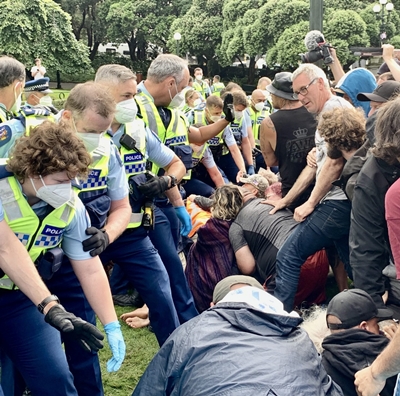The low approval rating of Chris Hipkins is symptomatic of a hollowed-out democracy...
WHEN CHRIS HIPKINS was asked this week why only 25 percent of those surveyed in the latest 1News-Kantar poll wanted him as Prime Minister, he replied that it had nothing to do with him. Instead Hipkins blamed his low approval rating on public disinterest. Politics was not occupying the thoughts of most people, said Hipkins. As the election drew nearer, he argued, people would begin to focus on what the political parties were saying.
But what Hipkins explains away as a temporary disinterest has, in recent years, become something rather more permanent. Disaffection with our politician institutions has grown. There is now a fundamental disconnect between politics and civil society.
That will be emphasised in October by the number of New Zealanders who will not vote. If history is any indication over 600,000 people will not participate in the election. When asked why they do not vote, a common answer is that people do not think that voting makes a difference because politicians are 'all the same'.
Commentator Bryce Edwards of the Democracy Project picked up on that indifference in 2017. He observed:
'Politics has become so removed from people's lives . . . We're not joining political parties. We don't really want to be involved in politics, we don't really identify with politics as much as we used to. Mostly it's become more bland over the last few decades. Politics has become more professionalised, more of a career, it's not the same.'
Whether a political leader promises to end child poverty or take climate change seriously, the stagnant pool of unfulfilled promises increases with each election and with it, further disillusionment with our 'representative democracy'. People have become more and more convinced that voting is pointless because nothing ever changes for the better in their own personal lives.
Various studies have expressed the view that it is the working class who have been most disenfranchised from the growing disconnect between politics and civil society. Working class people find it especially hard to make their voices heard via our present set of political institutions, which they find are largely closed and indifferent to them. And often hostile. The response of the political establishment and its courtiers has been to dismiss non-voters as 'apathetic' and 'irresponsible'. There have even been calls to make voting legally compulsorily in order to force people into the polling booths to vote for a party they don't support.
The political establishment is deaf to people's real concerns even when they are expressed in a starkly visible way as they were on the grounds of Parliament in February last year. But rather than recognise their concerns Prime Minister Jacinda Ardern refused to talk with protesters and joined in the headlong rush to condemn them as very bad people. But opinion polls showed that perhaps a third of the country supported the occupation.
What was an uneven and often confused expression of working class anger and frustration was smeared as a nascent alt right movement rather than what it really was, a symptom of a political system in decay.The same expression of political disenfranchisement we saw on Parliament grounds last year continues to be expressed in the lack of faith in our 'representative democracy'. The depoliticisation of politics that Bryce Edwards referred to in 2017 has contributed to a popular indifference and distrust of our parliamentary parties and of our political institutions.
Even a card-carrying member of the political establishment, former Prime Minister Helen Clark, has come to recognise, albeit circumspectly, that our 'representative democracy' isn't actually all that's it is cracked up to be. When asked what she thought what were the main threats to New Zealand's democracy she replied:
'The main threats here are … of complacency. That we don’t keep up with the times. The need for regulation of lobbying. The need for more scrutiny around – and openness around – the political donation issues. The issues of beneficial ownership. Just a whole lot of things … are nibbling away at us, and we need to arrest them before they get truly chronic – which they can if you just let things slide. So, “she won’t be right”. That’s my message.'
The problem is that the liberalism - the social democratic politics - that someone like Clark represents and which her Labour Party claims to represent - has become little more than a justification for the continuance of the status quo. It is a politics that virtue signals about issues surrounding race and gender and which are propagandised by mainstream media outlets but are of no threat to the economic and political status quo. Neoliberalism continues to prevail.
The hollowing out of our representative democracy means that political leaders like Chris Hipkins - and Chris Luxon - can only scrape together low levels of support from a civil society that has seen a significant number of people disengage from electoral politics altogether.
In New Zealand social democratic parties (and I use that term advisedly) like Labour and the Green's, are now little more than the representatives for the liberal slice of the ruling class. They are not representatives of the working class. And because they are not its representatives, they will continue to act against the interests of the working class. For those of us looking for a different kind of politics it is an issue that we have to be willing to confront or nothing will change. Simply saying that Labour is preferable to National or that Labour will do better 'next time' is simply kicking the can down the road and plays into the hands of those who want to keep things just the way they are.



0 comments:
Post a Comment
Comments are moderated.